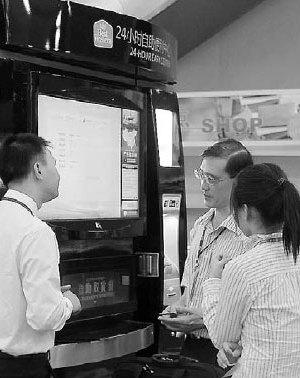
A technician (left) introduces functions of Travelers Convenience's vending machines to consumers in Beijing. [China Daily]
A network cable, an electricity supply and a vending machine - those are all the things forming a small terminal through which you can either book a ticket or search for a restaurant, besides buying a can of cola. All you need to do is to push the button, swipe your card and enter a password.
Sounds like a terminal combining Taobao.com and Wal-Mart, right?
That's what the Travelers Convenience Chain Stores Network Co Ltd is doing. Founded in 2008, the company has been awarded 14 international patents for vending machines that extend the range of the goods sold and combine several different functions in one simple machine. There are more than 60 kinds of services inside the small unit.
"The machine is a shopping platform, just like Taobao.com," said Guan Jianwen, chief executive officer of Traveler Convenience, likening it to China's eBay-styled online retailing website.
Because there are so many terminals in a lot of places, and they all require plenty of goods, the chain retailer can bargain with big suppliers such as Coca-Cola to get competitive prices.
Before establishing the company, Guan was CEO of the New West International Development Co Ltd, a company offering one-off shower items to hotels, for 10 years. When the government discouraged the provision of one-off shower products to visitors because of environmental concerns, it dealt a heavy blow to Guan's business.
"When watching the news on TV that day, the idea suddenly came to me that we can make a system to sell these things directly to the guests instead of selling them to the hotels. It is both environmentally better and convenient," said Guan.
He spent more than 50 million yuan ($7.51 million) developing an appropriate machine and invited the former technology director of EaseNet.com to be one of his key members of team. The new machine attracted widespread interest from hospitality operators at exhibitions.
"It is really good, since using a machine can save two employees," said Yu Xiaoxi, manager of Qiaoyuan Hotel in Zhuhai, adding that the cost of one machine is just 300 yuan, including the Internet fee and electricity charge, while the average monthly salary to an employee is more than 1,000 yuan.
People can book an air ticket or search for a restaurant via this machine. "Maybe in the future we can use this to replace the business center since it can help the guests do nearly all the kind of things the center offers."
In addition, the hotel can decide what goods and services are sold in the machine.
Now communities and schools, and not just hotels, are being targeted as customers. Guan said occupancy rates at hotels can affect profits, but communities represent a stable and growing market.
"Vending machines with vegetables and other daily necessities may be welcomed," said Guan, adding that the company is planning to offer a booking function so that consumers can order what they want online and then pick it up from the vending machine on their way home.
According to Guan's forecast, the machine will be in 500 hotels, communities and hospitals at the end of 2010. In 2013, 2014 and 2015, there will be 8,000, 15,000 and 20,000 respectively.
Guan said he was not worried by potential competition. "We will lead by constantly upgrading the technology, so we will always be ahead. Competition is an impetus for us and can drive us to go faster in the future," he said.
Lan Hai, vice-president of the Association of Vending Machine and Sell-service in China, said that network cable was not the way forward for vending machines. Rather, it is wireless 3G. "With 3G technology in the future, every vending machine can be connected to the Internet wirelessly and can be moved. Network cable can make it difficult to move a machine," he said.
According to statistics from Lan's association in 2009, there is a vending machine for every 40 persons in Japan. In China there is one for every 8,000 persons.





